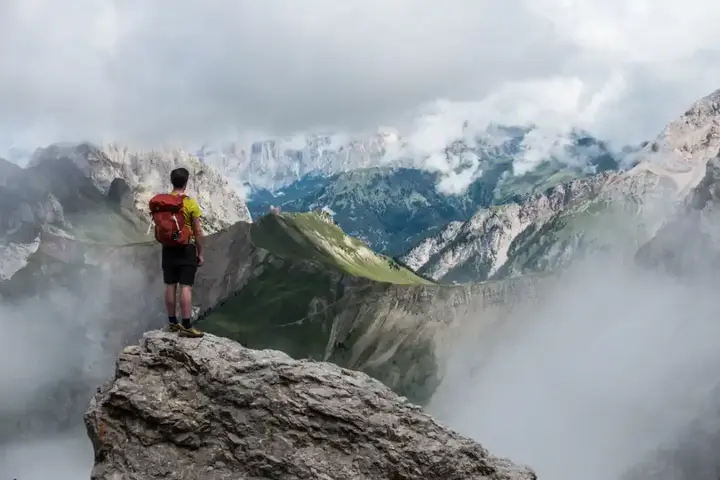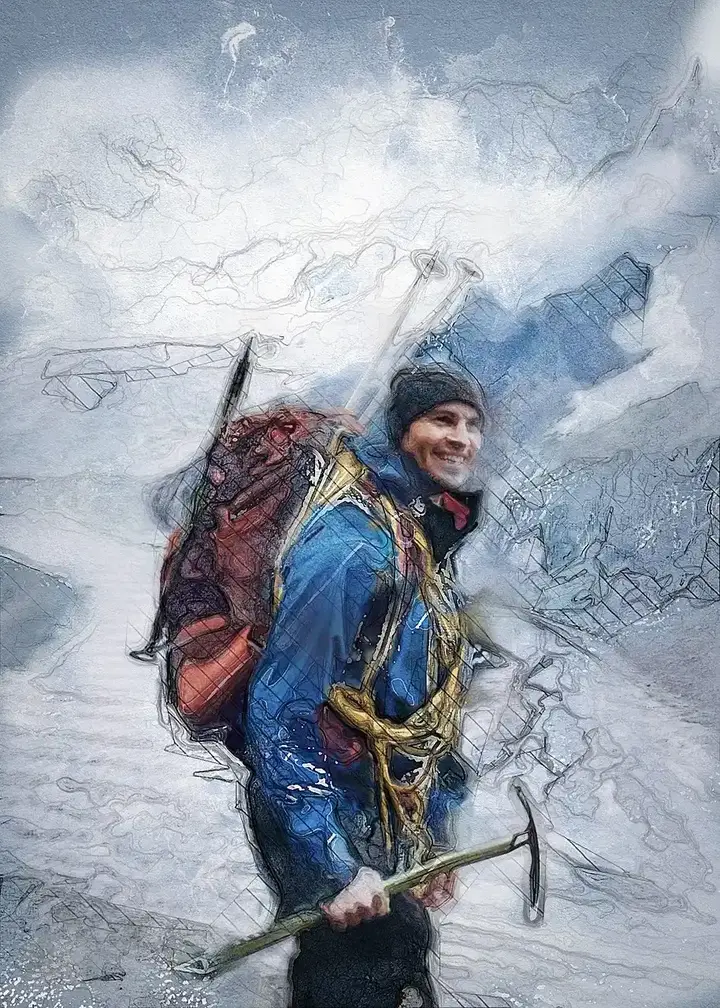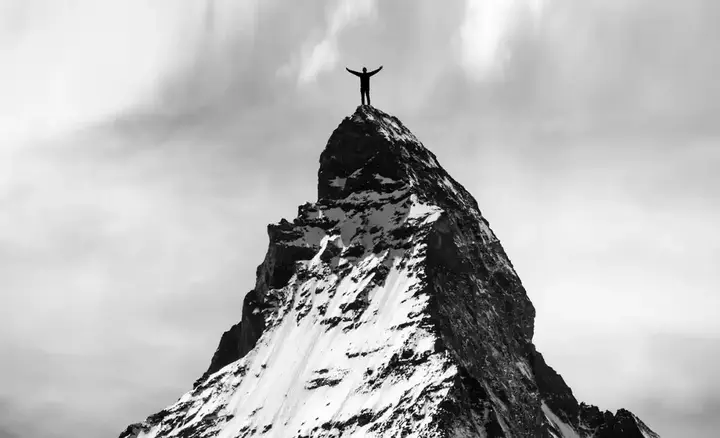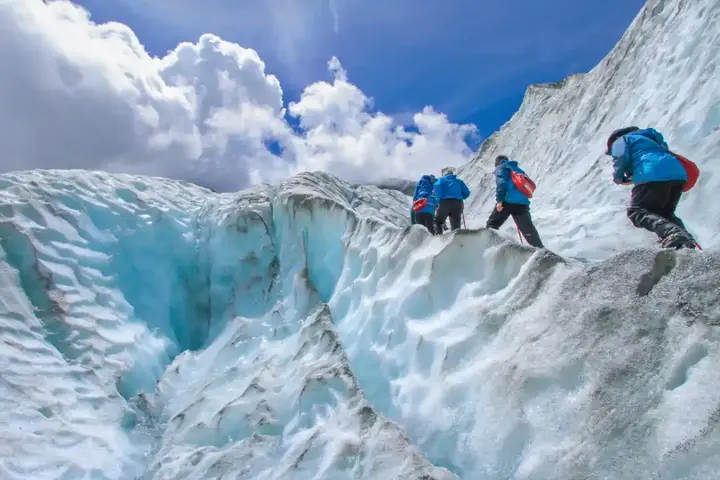Valuable life skills gained from mountaineering

Mountaineering is more than just an exciting activity; it's a valuable learning experience that extends far beyond mountain peaks, trails, glaciers and forests. Mountaineering aims to reach the top, which is a powerful and motivating goal, but the real value lies in the climbing journey itself. A mountaineering trip is similar to life itself, where climbers learn many skills that can be applied in all aspects of life.
Show key points
- Mountaineering serves as a powerful metaphor for life, emphasizing that the journey and lessons learned are more valuable than merely reaching the summit.
- Climbers develop critical life skills such as preparation, patience, resilience, decision-making, and taking responsibility amid physically and psychologically demanding conditions.
- The sport uniquely blends self-reliance with teamwork, demonstrating how independence and collaboration must coexist for collective success.
- ADVERTISEMENT
- Mountaineering teaches individuals to take full ownership of their actions and decisions, often under high-stakes, real-time consequences.
- Facing adversity on the mountain reinforces the importance of embracing suffering and discomfort as natural aspects of growth and progress.
- Failure is viewed as a learning opportunity rather than defeat, encouraging climbers to adapt, persevere, and continue striving toward their goals.
- Setting meaningful, long-term goals and breaking them into achievable steps is a key mountaineering principle that applies directly to achieving success in everyday life.
In the world of mountaineering, climbers face challenges that require them to overcome physical and psychological obstacles. This requires good preparation, patience, and the ability to work in a team, as well as the ability to be self-reliant. This experience teaches climbers how to make critical decisions in difficult circumstances, and to take full responsibility for the results of their decisions. In addition, they learn how to deal with failure and move forward despite difficulties, which enhances their spirit of perseverance and determination.
Recommend
Mountaineering teaches us that success is not always in reaching the top, but in the efforts made, the skills acquired, and the challenges we face and overcome. By climbing mountains, we gain new insights into how to approach life itself, where every step we take to the top becomes a symbol of every stage we take towards achieving our goals in life.
The power of self-reliance and teamwork

Few experiences teach us the importance of self-reliance and teamwork at once and in a way that shows how closely related both are like mountaineering. While climbing the mountain, we have to rely on ourselves to make decisions and keep ourselves safe. At the same time, we are part of the ropes team or expedition team and we have to work together as one unit to achieve our goals. This teaches us that while we need to be independent and dependent on our skills and knowledge, we must also collaboratively present our skills and knowledge to our team for the climb to succeed.
In a harsh high mountain environment, the ability of each climber to trust their own skills while relying on their colleagues is key. The interplay between individual competence and collective effort parallels many real-life situations, from professional environments to interpersonal relationships, highlighting the required balance between independence and collaboration.
Taking responsibility and accountability

On the mountain, there is no one else to blame or blame. Mountaineering teaches us the value of taking responsibility and ownership over our decisions. Every decision made on the mountain has consequences, and we are solely responsible for them. We cannot blame others for our mistakes or expect someone else to solve our problems. Even when challenges arise from unexpected natural forces, the burden of finding solutions remains on us.
This sense of responsibility is a crucial life skill. In mountaineering, the immediate and often severe consequences of bad decisions emphasize the importance of thoughtful and well-thought-out actions. This experience is transferred to everyday life, where taking responsibility for our actions and their consequences leads to personal growth and the ability to deal with complex situations effectively.
Accepting difficulties and challenges

Perhaps one of the most important life lessons anyone can learn is that suffering is an integral part of life. Mountaineering teaches us to accept suffering. Climbing the mountain requires physical and mental challenges that can be daunting, such as endurance of extreme weather conditions, altitude phobia, and physical exhaustion. Experience teaches us that life is not always comfortable, and we have to accept pain and suffering as a normal part of the journey.
By facing and overcoming these challenges, mountaineers learn resilience and the ability to persevere in the face of adversity. This lesson is invaluable in everyday life, where setbacks and difficulties are inevitable. Accepting and enduring suffering gives us the strength to face difficult times and move forward stronger and more capable.
Learning from failure and achieving goals

Mountaineering teaches us how to fail. Failure is an inevitable part of mountaineering, as we cannot always succeed in reaching the top. Sometimes, we have to go back because of unforeseen circumstances. Climbing teaches us that failure is not something to be ashamed of but rather a natural part of the learning process.
Those who choose not to fail misunderstand the essence of mountaineering and life. It's not about getting to each summit, it's about staying in the game for as long as possible. The only way to achieve this, as mountaineering clearly demonstrates, is to accept failure, learn from it, and strive to improve our performance next time. This mindset fosters flexibility and continuous improvement, both of which are important for personal and professional growth.
Setting value goals and incremental progress

Mountaineering teaches us how to set valuable goals and gradually work towards them. Standing at the bottom of the mountain makes the summit seem impossible. By setting an overarching goal or a valuable goal, and then taking incremental steps toward it, we learn to achieve our goals without being overwhelmed by the huge task.
In mountaineering, this can be by dividing the climb into a series of achievable stations or gradually learning skills to achieve a future climbing goal. This approach teaches us to set realistic goals and break them down into smaller, achievable tasks. Working systematically and patiently towards our goals teaches us how to take one step at a time, and this is an essential life skill.

In conclusion, mountaineering, with its inherent challenges and rewards, offers profound lessons that go beyond the physical act of climbing. Mountaineering skills—self-reliance, teamwork, taking responsibility, accepting suffering, learning to fail, and setting valuable goals—are universally applicable and invaluable in all areas of life. As we navigate our personal and professional journeys, mountain lessons can guide us, helping us overcome obstacles, work effectively with others, and achieve our goals with flexibility and determination.
Mountaineering teaches us to face our fears, push the limits of our capabilities, and gain us a way to embrace discomfort, knowing that every step forward, no matter how small, brings us closer to our goals. It instills in us a deep appreciation for preparation, perseverance and strength of the human spirit. By absorbing these lessons, we become better prepared to deal with life's difficulties, maintain a positive outlook, and persevere in achieving our dreams. In the end, the real summit lies not in the peaks we conquer, but in the strength and wisdom we gain along the way.
![]()
The dark side of early retirement
Early retirement sounds dreamy, but it's not all sunshine—many do it because they’re unhappy at work, feel hopeless, or want more time. But the risks are real: loneliness, regret, running out of money, and losing purpose. Think twice before jumping ship too early. more- ADVERTISEMENT
![]()
3 inspiring success stories in difficult times
Fred DeLuca’s journey from washing dishes to founding Subway proves that persistence can turn a simple idea into a global empire, while Steve Jobs and Paulo Coelho show how resilience in the face of setbacks can lead to world-changing success and creative brilliance. more- ADVERTISEMENT
![]()
How to learn German for free in 6 months
Learning German opens doors to job and study opportunities in Germany, Austria, and Switzerland. With dedication—three hours a day—you can reach intermediate level in six months. YouTube channels like Deutsch mit Mira, German with Mr. Shehata, and Khaled Bozan make learning fun and accessible for everyone. more- ADVERTISEMENT
![]()
The splendor of nature and the challenge of conditions in the oasis of Taghit in western Algeria
Taghit is a hidden gem in western Algeria, where golden dunes meet ancient history. Adventure seekers can sandboard down towering dunes, explore mysterious caves, or discover 20,000-year-old rock carvings. The ancient walled city of Kassar, once forgotten, is now being restored to its former glory. more- ADVERTISEMENT
![]()
Aswan City "Sono" ... Land of gold, tranquility and goodness
Aswan, once called Sono or the Land of Gold, is a magical city blending ancient history, stunning temples like Abu Simbel and Philae, and rare natural wonders—like shadowless solstice days. Its warm people, sun-filled skies, and legendary sites make it an unforgettable destination, especially in winter. more- ADVERTISEMENT
![]()
Why does my mood change when I'm hungry?
Feeling hungry can mess with your mood—fatigue, anger, confusion—all thanks to low glucose. As levels drop, stress hormones like cortisol and adrenaline kick in, making you irritable. Even fish get aggressive when hungry! So grab a healthy snack, keep calm, and maybe save your relationships along the way. more- ADVERTISEMENT
![]()
Golden hydrogen can change the course of the globe
Golden hydrogen, naturally formed deep underground, offers a clean, carbon-free energy source. It's abundant, renewable, and doesn't emit harmful gases, making it a game-changer for sustainable energy. Scientists are using AI to detect surface markers pointing to its presence, opening new frontiers in the search for eco-friendly fuel. more- ADVERTISEMENT
![]()
5 color effects on how much you eat
Colors around you can sneakily influence how much you eat. White, red, orange, and yellow can trigger overeating, while blue, purple, black, and brown might help you cut back. Green invites healthy choices. So, your plate and wall color might just be helping—or hurting—your diet without you knowing it. more- ADVERTISEMENT
![]()
Genetically engineered microbes: the future of sustainable agriculture
Genetically modified microbes are transforming farming by boosting crop growth, nutrient absorption, and resilience to stress. These tiny allies can cut chemical use, fight pests naturally, and even help tackle climate change—offering a smart, sustainable path forward for agriculture. more- ADVERTISEMENT
![]()
Black holes are common, so where are white holes?
White holes, theoretical opposites of black holes, may spit out matter but remain undetected. Though allowed by Einstein’s equations, they defy common physics and lack evidence. Some physicists now wonder if a dying black hole might transform into a white hole—an idea tied to solving deep cosmic mysteries. more- ADVERTISEMENT





















